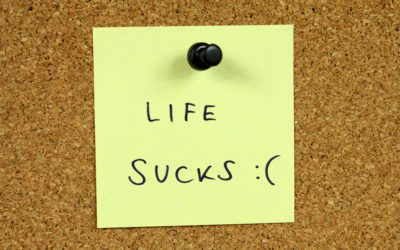For this third and final part of the series, I want to highlight how our natural feelings of care and caring can get hijacked by a simple misunderstanding of where our feelings come from and what they mean about us, our behavior, other people, and the world around us.
1. Why do we care about some things and not others?
I was fortunate in my upbringing to have a father who did what he loved, which in his case was engineering solutions to difficult problems (like landing safely on the moon) and manufacturing critical parts of the solution. But that’s the sexy version of the description – if you looked at what he and his company actually did, it pretty much all fits under the category of “drilling precise holes in metal cylinders of varying width and length”. So while I had no particular interest in what he did, I was suitably impressed by the way that he did it.
Where I took this in my own life was on a quest to find out what I loved to do and to find ways of making my living doing it. But where it took me was to a place where I wanted to focus exclusively on the bits of what I did that I loved and leave the rest to others, be they colleagues, employees, or even the gods.
This in turn led me to create businesses and a career that were inconsistent at best, occasionally soaring to heights beyond my imagination but often then falling back to earth with a very loud thud.
What I learned that changed all that for the better was a radically simple understanding of how the mind actually works:
100% of our experience of life is created in the mind from the inside-out. We’re living in the feeling of our thinking, not the feeling of our circumstances.
As I put this understanding to the test over time, I came to see that while it often looked like there were exceptions to the rule, closer examination always revealed my own thinking as being at the heart of my experience.
And then one day, I realized that I might have misinterpreted the source of my father’s happiness and success:
What if the difference that made the difference was not that he did what he loved, but rather that he loved what he did?Click To TweetSuddenly a new possibility appeared within my business. If the secret was not to find something outside me that I loved but rather to find the love and care inside me for whatever it was that needed to be done, how would that change the way I approached things?
I began to see how little attention I paid to things like selling and tracking and how much attention I paid to my own thinking about how much I disliked them. And I also saw how little attention it took to begin falling in love with selling and with knowing what was actually going on within my company.
While I still got a sinking feeling in my stomach from time to time when I thought about reaching out to prospects or wading through the monthly numbers, I no longer interpreted that feeling as being about sales or spreadsheets and began to see how it was simply the feeling of my thinking in those moments. It was telling me nothing about “what I was meant to be doing” and everything about what I was actually thinking.
As I continued to put this to the test, I found some new thinking began to emerge.
“What if I’m wrong? What if I didn’t hate sales? What if I wasn’t too shy to reach out to people? What if numbers weren’t beyond me? What if I wasn’t financially irresponsible?”
And slowly but surely, I began to fall in love with (and care about) sales and metrics as much as I love writing, coaching, and teaching.
This approach to questioning the solidity of our own reality is well-reflected in the Taoist book of wisdom, the Hsin Hsin Ming:
“You do not need to seek the truth – simply cease to cherish opinions.”
In other words, if all you did was to stop taking your own ideas about “the kind of person you are” and what you “inherently” like and dislike less seriously, you would begin to fall in love with everything.
Which probably seems either wonderful or awful to you depending on your understanding of…
2. What’s true before the therefore
When people first catch a glimpse of the inside-out nature of their personal reality, it’s surprising how often they freak themselves out with the imaginary consequences of their new understanding.
Among the most common ones I hear are:
- “But if my feelings don’t come from outside me, then I should just put up with everything I don’t like in my life.”
- “But if I can fall in love with anyone, I’d have no way to choose who to be with and I’d have to become polyamorous (which in turn would ruin my relationship/reputation/marriage).”
- “But if I can fall in love with (care for) anything, how do I know what to do with my life?”
To address these misunderstandings, I often make a distinction for people about what is true “before the therefore” and what seems true “after the therefore”.
Before the “therefore” (i.e. the apparent implications), some stuff is just true – impersonal stuff like gravity and the nature of thought and personal stuff like my in the moment and habitual thoughts and feelings about life. But these things are “true” in the engineering sense of the word – they are accurate depictions and descriptions of my current understanding and experience.
By way of contrast, every implication we make up about what something true “means” is fictional – a made up, make-believe interpretation or projection generally at least loosely based on the best data we have available.
For example, it was true (before the therefore) that for years I hated selling; it was a fiction that therefore, I would always hate selling and could only hope to outsource it, get it over with it as quickly as possible, or avoid the need for it altogether.
I’m asserting that it’s true (before the therefore) that 100% of our experience comes from within, but it’s a fiction that therefore, I have to put up with circumstances in my world or the world around me as they are.
And it seems to me to be true (before the therefore) that it’s possible to fall in love with and care deeply about anything, but it’s total fiction that therefore I have no reliable way to navigate my life.
Here’s what I’ve seen as I’ve spent more and more of my time looking for what’s true before the therefore and ceased to cherish my opinions about what seems like it would have to be true after the therefore:
There is an intelligence inside us that we can see in nature all around us. It runs the body and spins the planet, but is often harder to see in the unfolding of our own life.Click To TweetThis intelligence is already guiding you through your life, bringing you just-in-time wisdom and common-sense solutions to the challenges of daily living. If you let it, it will help you to navigate every aspect of your life. Better still, if you couple it with your natural capacity for love and care, it will prove to be the difference that makes the difference in creating a thriving business, a life that you love, and a world that works for everyone.
With all my love,
![]()










